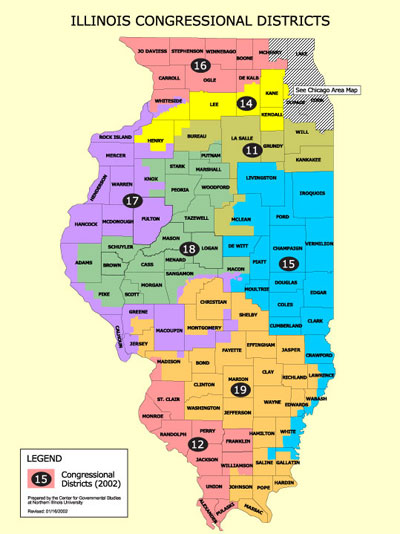Rep. Ray LaHood was on 1470 WMBD-AM this morning explaining and defending his position in support of House Speaker Dennis Hastert and in favor of reforming the page system. Most of that conversation was nothing new, but one passing remark LaHood made really irritated me. I don’t have an exact quote, but it was pretty close to this: “If my constituents feel I’m doing a bad job, there’s a referendum coming up in 32 days [Nov. 7] and they can vote me out of office.”
To a certain extent, that’s true. If he really ticked off enough people, they probably would kick him out of office. But the problem is that our congressional districts are drawn in such a way that instead of the voters choosing the representatives, the representatives choose their voters. It’s called gerrymandering, and it looks like this:

Notice especially the 17th district (in purple) along the western border of the state. Have you ever seen anything so ridiculous? It’s so egregious, The Economist recognized it as “the champion gerrymandering” of the whole country. It essentially takes Democratic voters out of the 18th district and puts them in the 17th district, helping the 17th district stay Democratic and the 18th district stay Republican. Lane Evans represents the 17th district; LaHood represents the 18th district.
In fairness, Evans and LaHood aren’t personally responsible for this inequity; they’re only the beneficiaries. The congressional districts are drawn (or, more accurately, manipulated) at the state level. But there is state legislation proposed that would change the way districts are drawn.
House Bill 3699, “The Legislative and Congressional Redistricting Act,” was proposed on March 10, 2005, by Republican Lee Daniels and would set up a redistricting plan similar to Iowa’s redistricting process, “where the non-partisan Legislative Research Unit draws the maps and writes the legislation with the advice of a 5-member appointed commission” (FairVote.org, the source of this explanation of the bill, has a wealth of information on gerrymandering in general, and Illinois’ pending legislation in particular).
I called Schock’s office to find out his views on this legislation, but was unable to get an immediate answer. Since the legislation was referred to the Rules Committee immediately after it was introduced, there hasn’t been any floor debate on it yet. It’s likely that he’s in favor of a fairer redistricting process, although he probably won’t be able to comment on HB3699 specifically.
If we want to see real accountability to the voters in this state, the gerrymandering has to stop. We should be writing to our representatives and demanding redistricting reform.
UPDATE: I received a call back from Rep. Schock’s office and he has expressed support for HB3699 or a similar bill that would reform the state’s redistricting process. HB3699 was referred to the Rules Committee by Speaker of the House Mike Madigan, and according to Schock’s office, Madigan is the one who has the power to bring it out of committee. It’s been in the Rules Committee since March 2005.
Well, then I called Rep. Daniels’ office (Elmhurst, IL) to find out some more information about the status of the bill. His office confirmed that Speaker Madigan had referred it to the Rules Committee and that the bill is dead. Since Daniels is retiring this year, he won’t be back next legislative session to reintroduce the bill. So, it needs a new sponsor.
I called Rep. Schock’s office to request that he (should he be reelected) sponsor this or similar legislation. (I say “similar legislation” because I’m not tied to Daniels’ particular plan; there’s more than one way to reform the process. The important thing is to ensure the redistricting process is indeed reformed so that regions, not political loyalties, are represented.) His staff will confer with him on it and let me know. I’ll let you know what I find out.

 From a
From a 
 Former Illinois governor George Ryan was
Former Illinois governor George Ryan was